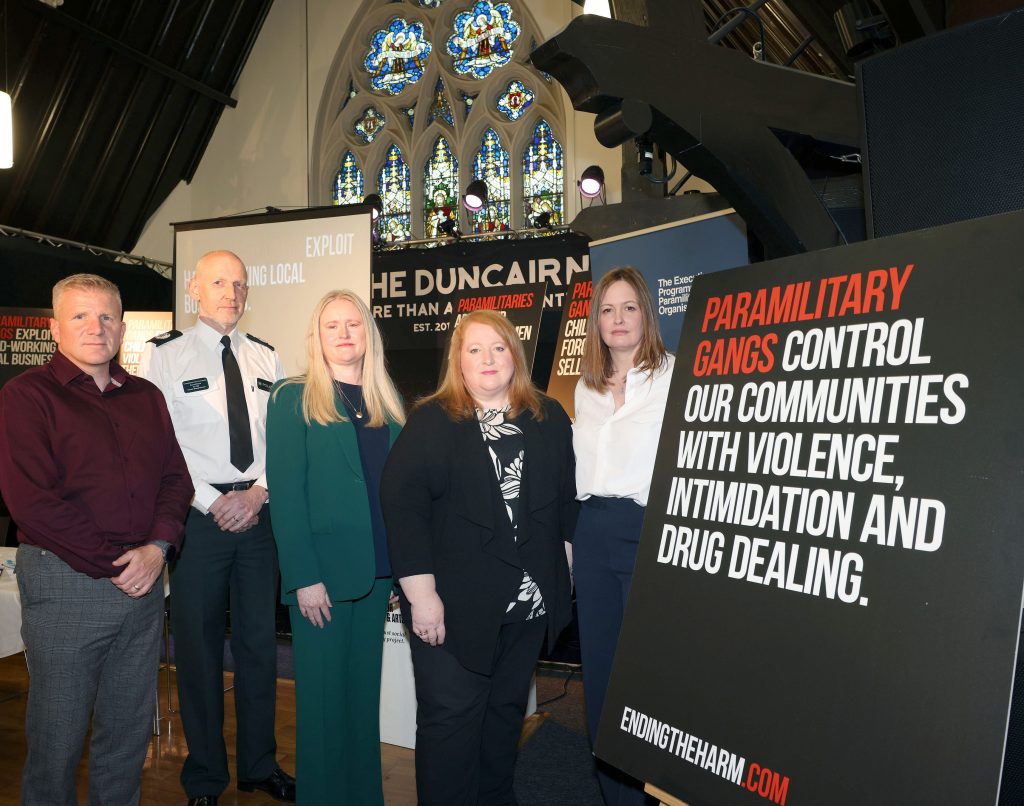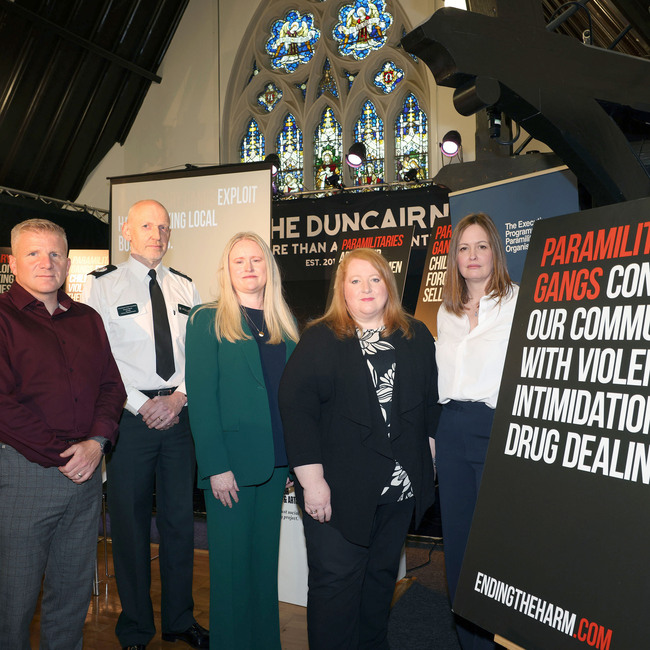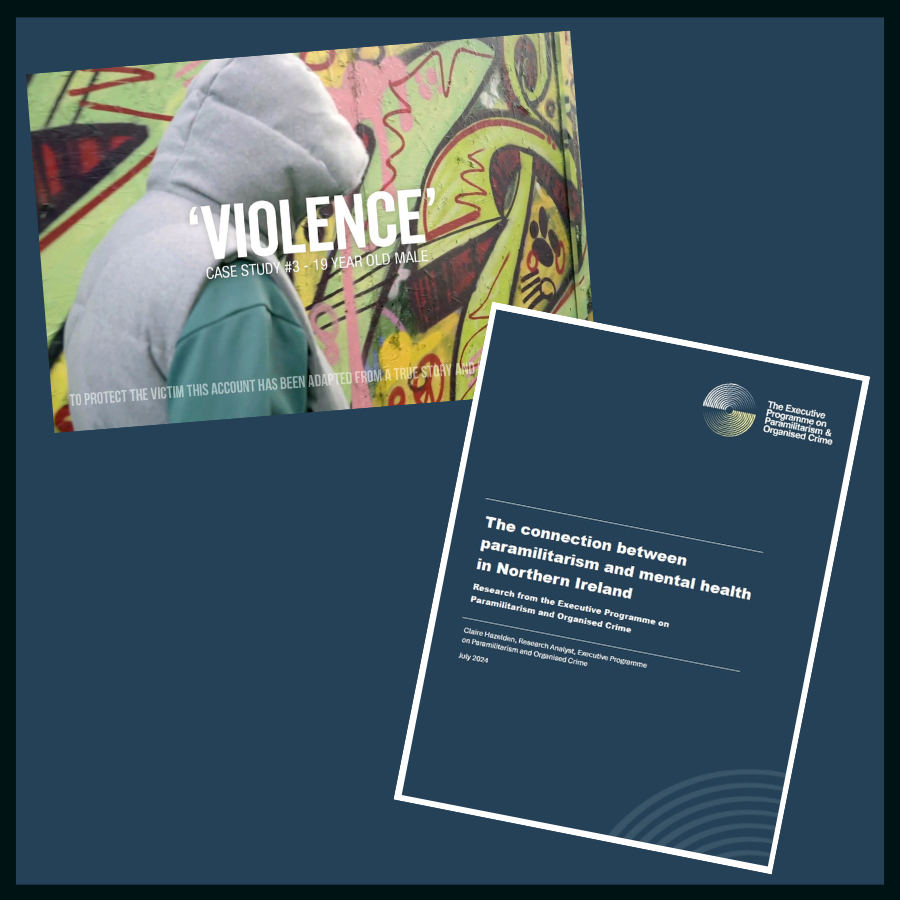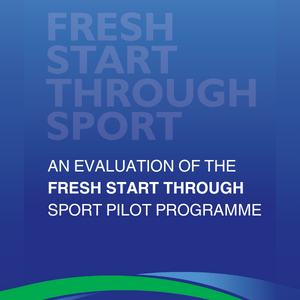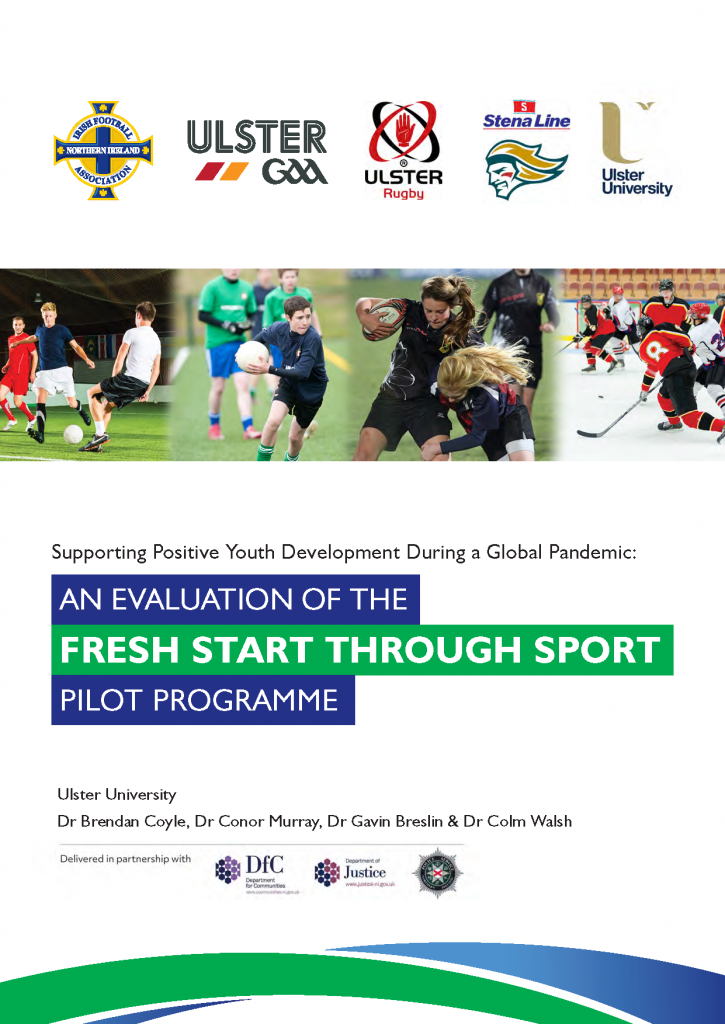The new ‘Ending the Harm’ public awareness campaign shows how people are being exploited by paramilitary gangs in often ‘hidden’ harms. To develop this campaign, we consulted with a wide range of people and organisations, covering the public, private, community and voluntary sectors. At today’s launch a wide range of organisations and experts were keen to lend their support for our work. A selection of quotes are below.
Justice Minister Naomi Long said: “The hidden harms highlighted in this new campaign are examples of those which are perpetrated daily by paramilitary criminals. They are compounded by drug trafficking, intimidation, coercive control of communities, money lending, physical and mental abuse, and undermining the law and criminal justice structures. The result is a complex web of control that extends deep into communities.
“It is important therefore that we challenge the true nature of paramilitary influence so it cannot hide in plain sight and it is no longer accepted as normal or inevitable. We want to empower our communities and encourage victims to come forward and get support.”
The Minister added: “Political and community leaders must show courage and leadership on these issues – the courage to speak openly about uncomfortable truths, the courage to challenge long-standing power structures, and the courage to deliver what has been agreed in the Fresh Start Agreement. We all have a role to play, and I hope that this campaign will play a part in supporting this action.”
The Political Advisory Group to EPPOC, comprised of representatives from Executive parties Sinn Fein, DUP, Alliance, and UUP, has welcomed this new phase of the campaign, issuing the following collective statement:
“We continue to support the vital work aimed at supporting communities and individuals vulnerable to paramilitary harm. The Executive Programme on Paramilitarism and Organised Crime (EPPOC), which was recently extended until 2027, plays a critical role in coordinating, understanding and raising awareness of this issue. This is evident in the latest phase of the Ending the Harm campaign being launched today which draws on EPPOC’s knowledge of the often hidden harms inflicted on communities by violent groups using paramilitary names. Collectively, we believe that it is important to call this criminality out for what it is and facilitate a whole-of-society conversation about that activity, its consequences and causes. This will better enable all of us to ensure that the focus on addressing this harm is best placed, now and in the future.”
Commissioner Designate for Victims of Crime Geraldine Hanna said:
“So called paramilitary gangs are criminals who commit some of the worst crimes against innocent people in their community. We know that these groups abuse and control women and girls and force young people into criminality. These gangs prevent victims from seeking support or justice through coercion and fear.
“There can be no place for these organisations in our public life and we must not allow them to be legitimised in any way. I hope this campaign can help to call out these gangs for what they are, criminals who are a scourge on our society.”
The NI Commissioner for Children and Young People, Chris Quinn said:
“The launch of the next stage of the Ending the Harm campaign is incredibly important and I fully endorse its purpose and need to address paramilitary control. Children are being coerced, abused, and groomed by these criminals who prey on the most vulnerable – it needs to be called out for what it is, and it needs to stop immediately. My office and I have and will continue to ensure that the rights and best interests of children and young people are safeguarded and promoted. We will continue to work to provide advice to the government on adopting a strategic and unified approach to protect children from harm. This will involve tackling and eradicating poverty, addressing educational inequalities, and supporting vulnerable families. Those who seek to harm, abuse and exploit children, families and communities must be pursued and prosecuted. Children and their families need to feel safe to thrive and I will do everything I can to protect them.”
Police Service of Northern Ireland Assistant Chief Constable Davy Beck said: “There is absolutely no place in our society for paramilitary groups and their criminal activities, whether money lending, drug dealing or extortion. These groups use a regime of intimidation, fear and violence to exercise their control over, and take advantage of, innocent people.
“Victims are too afraid to come forward and speak up, and we’re left with a worrying cycle of silence, and this is the very issue that we’re trying to address along with our partners. Our communities don’t want to, and don’t deserve to, live in fear of threats of violence. This is not acceptable in any shape or form, and it’s time to say, ‘enough is enough’.
“Police, along with our partners in the Paramilitary Crime Task Force, continue to carry out extensive investigations, search operations, and arrests for all types of criminality linked to paramilitary groups. While we will continue to relentlessly pursue all involved in illegal activity, we cannot tackle this issue alone. I’m appealing to all victims, as well as those who have information, to come forward and speak to us.
“We completely understand that fear can create huge barriers to reporting but we are here to listen, to help and to keep you safe.”
Dr Colm Walsh, Queen’s University Belfast said:
“We have a lot to be thankful for. For the most part, people’s lives are better and safer than they were only a few decades ago. However, this isn’t the case for everyone. Some people, and some communities have never really recovered from the trauma of violence and conflict. It is here that people’s pain is still being manipulated and exploited. There is a convincing body of research that captures their voices and experiences. The harm they experience takes many forms, affecting children, families and communities in different ways. Victims sometimes don’t even see themselves as victims as we saw in the recent unrest.
“People are still being caught up in cycles of violence, recycling harm over and over again. The launch of this new Ending the Harm campaign by the Executive Programme on Paramilitarism and Organised Crime is important because it shines a light on a harm that is all too often hidden. It will hopefully start a conversation about the type of place this can be. Freedom from violence, exploitation and abuse isn’t a luxury, it’s a right. This campaign is a call to action.”
Joanne Barnes, Nexus CEO, a local charity which supports people who have experienced sexual abuse and abusive relationships said:
“So called ‘paramilitaries’ are criminal gangs who exploit people for their own gain and have no place in our society.
“It is important we recognise the hidden reality that these gangs sexually exploit women and children. Women and children are then silenced and intimidated and so don’t reach out for the help they so desperately need.
“This campaign will highlight these hidden crimes and give confidence to survivors of exploitation to come forward for support, regardless of whether they want to report the crime to the PSNI.”
Bernie McNally, Independent Chair of the Safeguarding Board for Northern Ireland said:
“The Safeguarding Board NI wholeheartedly supports this campaign, highlighting the harms committed by paramilitaries on communities. In particular, we are pleased that the voices of children have been heard. That children’s experience of abuse, perpetrated against them by individuals who are paramilitaries and or sanctioned in the name of paramilitary gangs is being called out for what it is; child abuse. Child abuse robs children of their childhood and we must all work together to build a system in which children feel safe to disclose their abuse, in the confidence that abusers will be held to account and justice will be served. All children have a right to live a life free from harm and abuse.”
A spokesperson for the Security Industry Authority said:
“Paramilitaries are criminal enterprises who we know exploit the security industry for their own ends. The impact this has on undermining public safety across communities in Northern Ireland cannot be overstated. The SIA wants a safe business environment that provides a level playing field for all. We work with a range of authorities in Northern Ireland to help protect local businesses and communities from organised criminality. We fully support the work of EPPOC in their aim to end the harm caused by organised crime groups operating in Northern Ireland.”
A spokesperson from the Federation of Small Businesses in Northern Ireland said:
“At FSB NI we represent small businesses across Northern Ireland and are committed to helping them succeed. They are the backbone of the economy, creating jobs and driving innovation, despite myriad challenges. What they should not have to be dealing with is the continued existence of paramilitary gangs using intimidation to demand ‘protection money’.
“The Belfast Agreement was signed over 25 years ago and these criminal gangs only exist to line their own pockets at the expense of hardworking men and women who are doing their best to bring jobs and prosperity to their local communities.
“We welcome this initiative from the Executive Programme on Paramilitarism and Organised Crime (EPPOC). Menacing threats from paramilitary gangs are designed to intimidate businesses and prevent them going to the authorities. We hope the new EPPOC campaign puts a spotlight on the issue and encourages any business facing this type of intimidation to come forward to the police. By working together I hope that we can help end the scourge of paramilitary intimidation.”
A spokesperson for Victim Support NI said:
“Paramilitaries have a negative and controlling influence on communities throughout Northern Ireland, affecting the lives of vulnerable young people, women, and girls through insidious behaviours such as grooming, criminal and sexual exploitation, coercive control, and violence. Victims of paramilitary harm must not be allowed to fall through the cracks. They should be safeguarded and protected to reach their full potential, instead of living in a culture of fear and resigned to a life of exploitation and crime.
“Victim Support NI support this campaign from The Executive Programme on Paramilitarism and Organised Crime and are here to offer free and confidential support to anyone who has experienced, or is currently experiencing paramilitary harm. We welcome such powerful messages calling out paramilitary gangs for their part in these damaging criminal activities and would encourage victims to reach out and seek support.”
A spokesperson for the charity Crimestoppers UK said:
“We support today’s launch of this important campaign. Crimestoppers is here for all communities in Northern Ireland that are being impacted by harm. If you know of anyone being harmed by criminal activity, please contact Crimestoppers. Crimestoppers is a charity and is independent of the police. They guarantee you stay 100% anonymous. Always. Visit Crimestoppers-uk.org or call the 24/7 Contact Centre on 0800 555 111.”
